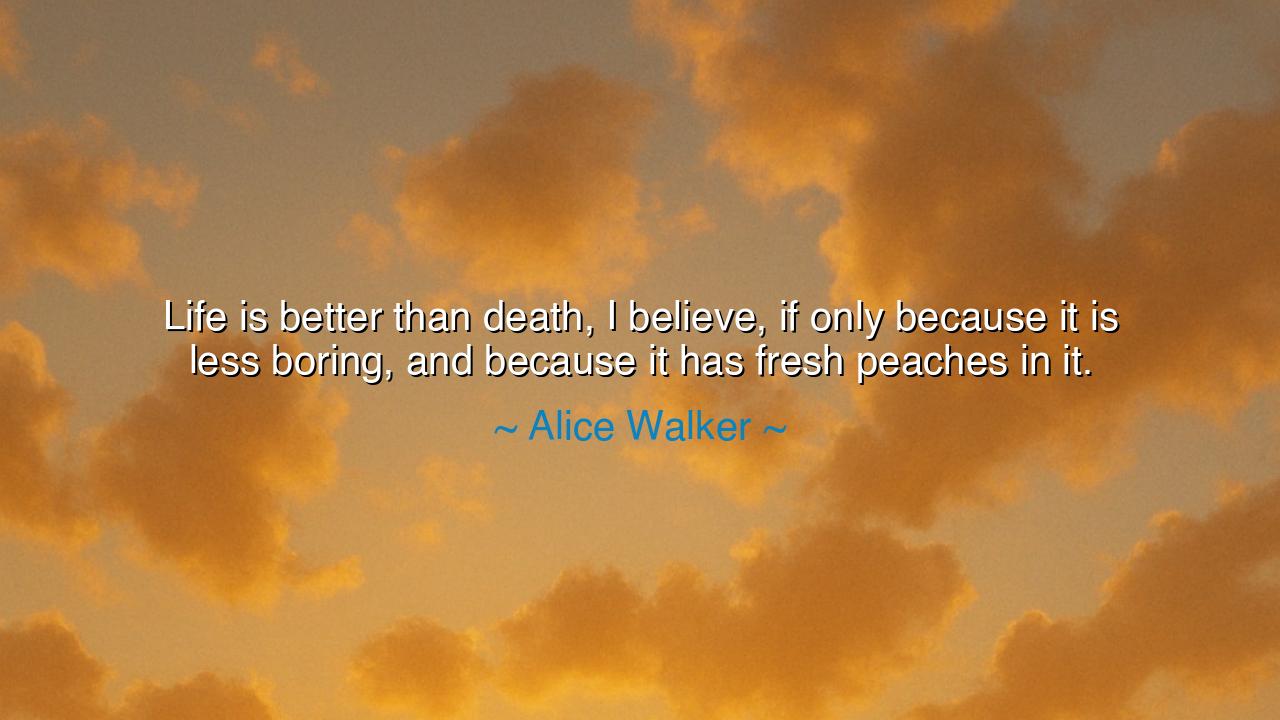
Life is better than death, I believe, if only because it is less
Life is better than death, I believe, if only because it is less boring, and because it has fresh peaches in it.






The writer and visionary Alice Walker, in her luminous words “Life is better than death, I believe, if only because it is less boring, and because it has fresh peaches in it,” offers a truth at once simple and profound—a hymn to the sacred joy of living. Beneath the playful tone lies a radiant philosophy: that existence, with all its imperfections, is still a miracle worth cherishing. She reminds us that even amid suffering, loss, and impermanence, there remain small, tender wonders—fresh peaches, sunlight, laughter—that make life infinitely precious. Her words are not a denial of death, but a celebration of the vital beauty of being alive.
To call life “less boring” than death is to awaken us from spiritual sleep. It is to say: while we breathe, we can still feel, taste, wonder, create, and love. Death may be peaceful, but it is also silent—it holds no music, no scent, no motion. Life, by contrast, is noisy and unpredictable; it astonishes us with its endless variety. Every sunrise is a new page, every encounter a mystery. Even in its chaos and pain, life is vibrant—it stirs the soul, challenges the heart, and keeps the spirit awake. To be bored by living is to have forgotten to look closely, to have ceased to marvel at the everyday miracles that unfold before us.
When Walker speaks of fresh peaches, she is not merely praising fruit; she is invoking the essence of the sensory world—the sweetness of being, the pleasure of presence. The peach, soft yet strong, fleeting yet beautiful, becomes a symbol of everything that makes life worth enduring: taste, texture, sunlight, and memory. To bite into a peach is to experience the holiness of the moment—to be reminded that life is not found in grand achievements, but in small joys. The ancients too knew this truth: that even a single blossom could carry eternity within it.
Consider the story of Helen Keller, who, though blind and deaf, once wrote that she found life “so beautiful” because she could feel the warmth of sunlight and the touch of her friends. She could not see a peach’s color nor hear the sound of its skin breaking under the thumb, yet she felt its spirit. In her quiet world, she discovered infinite richness—proof that life’s value does not depend on what we lack, but on what we choose to notice. Like Walker, she teaches us that gratitude transforms existence from monotony into wonder.
Life is better than death not because it is easier, but because it offers the divine privilege of change. In life, we may fall, but we may also rise; we may lose, but we may also find; we may sorrow, but we may also rejoice. Death is finality; life is motion. It is a dance between despair and delight, light and shadow, hope and heartbreak. And though that dance can be exhausting, it is also glorious. To live is to be part of the grand unfolding of the universe, to play one’s note in the eternal symphony of creation.
Yet there is wisdom, too, in Walker’s humor. Her mention of peaches disarms the solemnity of mortality, reminding us that wisdom need not be grim. The truly enlightened do not scorn joy; they honor it. They understand that laughter, simplicity, and sensual pleasure are holy acts in themselves. For to savor a peach with full awareness is to say yes to existence—to embrace the divine in the ordinary. The one who can find beauty in the smallest thing will never be poor in spirit.
Therefore, my child, remember this teaching: Do not wait for grand moments to affirm life’s worth. Seek it now—in the sunlight that warms your face, in the fruit that stains your fingers, in the laughter of friends, in the silence that follows rain. For one day, death will indeed come, as it must for all. But until that hour, let every breath be a hymn of gratitude, every act of awareness a prayer. Live as one who knows that the universe has offered you a gift rarer than eternity—the chance to taste the sweetness of existence itself.
So let Walker’s words echo through your days: cherish the fresh peaches, the fleeting joys, the vibrant pulse of the world. For it is in these humble blessings that life triumphs over death—not with grandeur, but with grace. To live, truly live, is to awaken each morning in wonder, whispering to the universe, “Thank you—for another taste, another breath, another dawn.”






AAdministratorAdministrator
Welcome, honored guests. Please leave a comment, we will respond soon